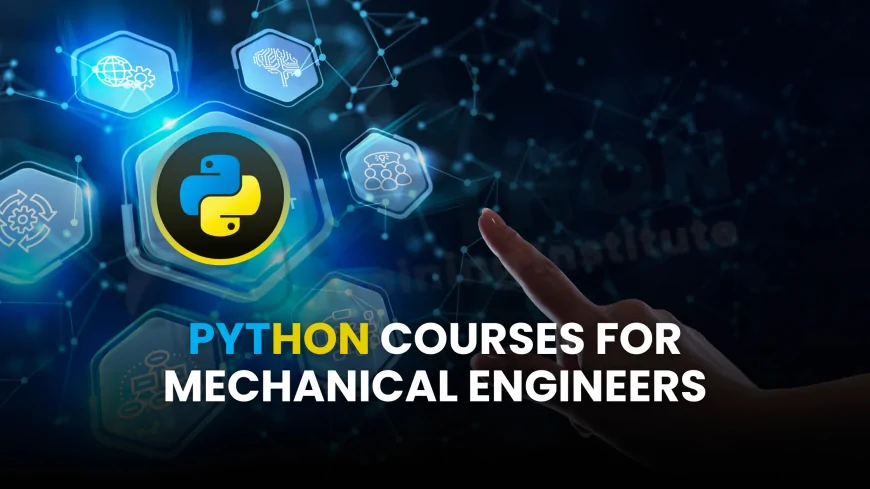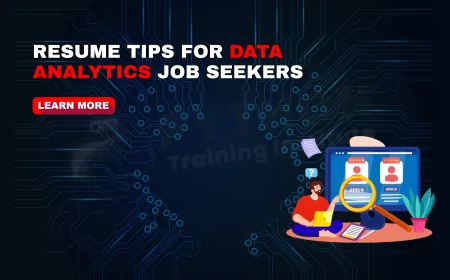Python Courses for Mechanical Engineers Pune | Best Python Classes for Mechanical Engineering Students Pune
Explore the best Python courses for mechanical engineers in Pune. Learn CAD scripting, simulation, automation, and data analysis with real-world projects and job support.

Table of Contents
- Introduction
- Why Python Is Valuable for Mechanical Engineers
- Key Skill Areas Covered
- Top Pune Courses for Mechanical Engineers
- Project Examples & Lab Work
- Training Formats & Duration
- Career Outcomes & Industry Access
- Fees & ROI Evaluation
- Choosing the Right Course
- FAQs
- Conclusion
Introduction
Mechanical engineers in Pune are increasingly adopting Python to enhance capabilities in automation, simulation, data analysis, CAD scripting, and more. Specialized courses are available to help practitioners bridge the gap between mechanical engineering and software engineering, ensuring they stay competitive in evolving industrial roles.
Why Python Is Valuable for Mechanical Engineers
- Automation & scripting: Automate repetitive tasks like CAD operations or data extraction.
- Simulation & FEA/CFD integration: Use SciPy to solve differential equations and build solvers :contentReference[oaicite:1]{index=1}.
- Data analysis & visualization: Manage sensor or design data using NumPy, Pandas.
- Custom tool creation: Develop scripts for behavior prediction, optimization, or reporting.
- CAD & API interaction: Integrate Python with CAD tools for parametric design.
- Career advantage: Engineers with Python often transition to simulation developer, data analyst, or automation roles :contentReference[oaicite:2]{index=2}.
Key Skill Areas Covered
| Area | Typical Modules | Usage in Engineering |
|---|---|---|
| Python Basics & OOP | Syntax, functions, classes, modules | Clean, reusable engineering scripts |
| NumPy & SciPy | Arrays, solvers, interpolation, ODEs | FEA/CFD solver support, curve-fitting |
| Pandas & Matplotlib | Dataframes, plotting, reports | Sensor/data analytics, visualization |
| Automation & CAD scripting | API usage, batch file handling | Automated BOM checking, CAD model param |
| Simulation tools | SimPy, PyVista, pyaedt | System simulation, post-processing |
| File I/O & Reporting | Excel, CSV, DOCX scripting | Engineering report automation |
Top Pune Courses for Mechanical Engineers
- Webasha Technologies – Offers Python training tailored for mechanical engineers, utilizing engineering-focused IDEs and a unique blend of theory and hands-on application.
Project Examples & Lab Work
- Pendulum simulation: Numerical solver using SciPy for motion equations (Skill‑Lync project) :contentReference[oaicite:12]{index=12}.
- Curve fitting: Polynomial and spline fitting for stress–strain data.
- Automated CAD batch scripts: Rename, export, update parameters via API.
- FEA post-processing: Data parsing and 3D visualization using PyVista.
- Thermal test automation: Reading temp logs, filtering outliers via Pandas.
- Excel report generator: Extract and format test results into templates.
Training Formats & Duration
- Short workshops: 1–2 week intensives (e.g., ZCOER)
- Online certification: 4-week Skill‑Lync with flexible pricing
- Full-time bootcamps: 3–4 month courses with industry labs (AVD, 360DigiTMG)
- Part-time/weekend: 2–3 months for working professionals (Upshot, 3RI)
- Hybrid models: Combine live online, self-paced videos, and local labs
Career Outcomes & Industry Access
- Solver/Simulation engineer: Use Python for custom code and integration.
- Automation engineer: Python scripts automate test rigs or CAD jobs.
- Data analyst: Analyze sensor/system data for trends and reporting.
- Developer roles: Mechanical-engineer-turned-python developer in CAE firms.
- Freelancing: Build CAD or data scripts for engineering teams.
- Salary uplift: Graduates report ₹5–10 LPA depending on experience ⎯ with Python skills highly valued :contentReference[oaicite:13]{index=13}.
Fees & ROI Evaluation
| Institute | Fees (Approx.) | Duration | Features | Expected ROI |
|---|---|---|---|---|
| Webasha Technologies | ₹18,000 – ₹30,000 | 6–8 weeks | Python + Engineering applications, weekend classes, real-world mini-projects | High – Ideal for engineers switching to automation or data analysis roles |
-
Short-Term ROI (0–6 months):
Mechanical engineers with Python skills can start freelance projects, internships, or junior data roles with ₹3–5 LPA packages. -
Long-Term ROI (1–2 years):
With added domain certifications (like CAD scripting, MATLAB-Python integration, etc.), students can pivot into lucrative automation, data science, or embedded development careers with ₹6–10 LPA potential. -
Added Value:
Institutes offering placement assistance, capstone projects, or hybrid formats (online + offline) increase job-readiness significantly.
Choosing the Right Course
- Start with short courses if you're new to Python.
- Prefer hands-on training with mechanical examples (SciPy, FEA).
- Check for CAD/API lab support.
- Small batches (<25) allow mentorship and lab time.
- Placement or project support is essential for career transitions.
- Look for alumni testimonials in engineering roles.
FAQs
1. Can mechanical engineers learn Python from scratch?
Yes—many courses start with basics and build up to engineering applications.
2. How long before I can automate a CAD task?
In focused courses of 4–8 weeks, you can develop simple CAD automation scripts.
3. Do these courses cover simulation?
Courses like Skill‑Lync integrate SciPy and SimPy for basic simulation help.
4. Are CAD APIs taught?
Yes—advanced courses teach scripting for CAD tools like Creo, SolidWorks.
5. Is Python relevant in CAE?
Python is vital for preprocessing, post-processing, solver automation, and API handling.
6. What salary increase can I expect?
Engineers with Python skills report earnings in ₹5–10 LPA ranges.
7. Are these courses online?
They’re offered online, offline, hybrid or bootcamp formats for flexibility.
8. Will I get placement help?
Yes—many providers include placement assistance and mock interviews.
9. What projects will I build?
Expect scripts for simulation, data analysis, CAD automation, batch reporting, etc.
10. What’s the ROI timeframe?
Typically recouped through freelancing or job roles within 2–6 months.
11. Is prior coding required?
No—beginner-friendly modules introduce coding gradually.
12. Are small batches beneficial?
Yes—personalized projects and mentorship need fewer than 25 students.
13. Do professionals enroll?
Many working engineers attend part-time or weekend batches.
14. Can I freelance post-course?
Absolutely—engineering automation and data services are in demand.
15. How are course materials accessed?
Most offer LMS access with videos, labs, and reading material.
16. Do you need a laptop?
Yes—ideally one with Python, SciPy, CAD APIs installed; Linux/Windows both work.
17. Can I learn simulation later?
Yes—after basic Python, specialized simulation or FEA courses are a natural next step.
18. Do I get certificates?
Yes—certifications or completion proof are provided by most institutes.
19. Are refunds available?
Short courses often offer refund periods; check individual policies.
20. How to evaluate a training?
Compare curriculum relevance, mentoring, mechanical project examples, alumni results, and placement support.
Conclusion
Pune offers a rich array of Python courses designed specifically for mechanical engineers—whether you're starting with basic scripting or working on advanced simulation. From short 4-week online modules (Skill‑Lync) to in-depth bootcamps (AVD, Upshot) with real-world projects and placement aid, these programs help mechanical engineers bridge to roles in automation, data analysis, CAE, and simulation. Selecting a course that emphasizes engineering applications, provides hands-on labs, and supports career outcomes ensures a strong return on investment.
What's Your Reaction?
 Like
0
Like
0
 Dislike
0
Dislike
0
 Love
0
Love
0
 Funny
0
Funny
0
 Angry
0
Angry
0
 Sad
0
Sad
0
 Wow
0
Wow
0














